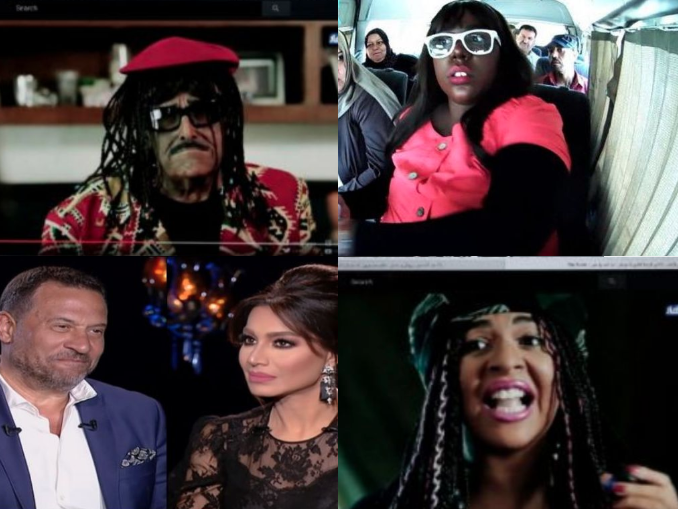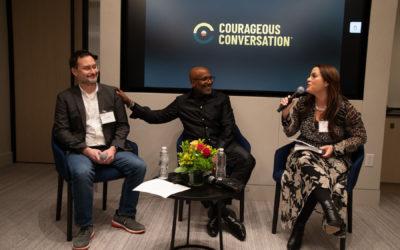By Nour Eltigani—May 29, 2019
In light of the recent backlash Egyptian actress and comedian Shaimaa Seif faced after appearing in an episode of the Ramadan prank program ‘Shaklabaz’ wearing blackface to portray Sudanese women, Egyptian actor Maged El-Masry spat racist remarks towards African women when he appeared on the show ‘Sheikh El-Hara’ hosted by Basma Wahba resulting in the show getting suspended by Egypt’s Media Syndicate.
In an on-air interview, El-Masry recounted with the host a what he considered a “funny” story of a “prank” his friend played on him. El-Masry said that his friend told him that three female fans really wanted to meet him and decided to meet at Roxy Square. When he arrived to Roxy Square that night, three women wearing veils covering their faces hopped into his car.
The moment they exposed their faces he was horrified at the sight of their dark skin complexion revealing that they are ‘African’. Wahba was very amused by his reaction and continued to laugh while he revealed that he literally kicked them out of his car. In case him saying it was not vile enough, El-Masry gestured how he kicked them out of the car, by literally kicking his foot in the air, as Wahba’s laughter grew louder.
Since the episode aired on May 19, a massive wave of backlash hit social media criticizing both El-Masry for his racism comments and Wahba for her reaction, an ample amount of people filed complaints to the extend that the Media Syndicate banned the show from being aired effective immediately for breaching ‘professional and ethical standards’.
“The episode also violated the law of the Media Syndicate No. 93 of 2016, which prohibited the practice of media activity without registration in the syndicate’s schedules or obtaining a permit to practice a profession, as she (Basma) did not formalize her activities with the syndicate and is not bound by any registration schedules. She did not obtain a permit to practice the profession in accordance with articles 2-19 of the syndicate’s law,” Head of Media Syndicate Tarek Saada’s official statement read.
Following the backlash, El-Masry told Youm 7 news website that he was just “joking” and did not mean to offend anyone, because “I am African too.”
“I misspoke. I apologize to anyone who was offended,” the actor said.
Wahba, meanwhile, announced that she is resigning form the show in protest to stop Al-Kahera Wel Nas, the channel that airs the show, from airing reruns of another controversial episode.
In the time I am writing this article, the video of the episode has been removed from YouTube as well.
Like I mentioned earlier, this is not the first incident that takes place this month, and certainly not the first racist debut in Egyptian television and media for the portrayal of Sudanese and other African cultures during the month of Ramadan under the cloak of “comedy”.
I say “Sudanese” because in my experience, Egyptians categorize any person who is “dark-skinned” as Sudanese regardless of their true nationality.
With that being said, some depictions have been intended to in fact depict Sudanese people such as Seif’s character in ‘Shaklabaz’. And while Seif was wearing blackface in multiple episodes on the show, which was airing in MBC Masr, this particular episode drew so much controversy and angered so many Sudanese people calling to boycott the network to the extent that MBC had to issue a statement saying they had nothing to do with the production of the show.
In the episode, Seif attempts to speak in a Sudanese Arabic while trying to translate what seems as gibberish form of Sudanese “language”. Both characters where represented as “loud” and “uncivilized”, a common stereotype Arabs and Westerners associate with Africans.
Meanwhile, Seif said “I am a comedian doing comedy. I wished that you would view the matter in the comedic context that was intended. Of course I did not mean to upset you,” before suspending her social media accounts because she was receiving hate from both the Sudanese and Egyptian audience. The promo of the episode has since been removed from Twitter and Facebook.
In recent years, this seems to be a common theme in Ramadan.
Last year, a show starring Egyptian comedian Samir Ghanem and his daughter Emy Samir Ghanem called ‘Azmi We Ashgan’ aired in Al-Nahar TV channel. Both Ghanems wore blackface and dreadlocks to mimic African culture. ‘Ashgan’ , played by Emy, was Sudanese Malawian housemaid working for an older Egyptian man.
The man attempted to make sexual advances towards her prior to her father’s arrival. Her father then asks the man if he can live with them in his house to which the man responded saying “Did I get this house for fun or did I buy it to set free some slaves?”
What is different this year is that the media channels received criticism from a Sudanese and an Egyptian audience, when usually it was only Sudanese people who would voice their disappointment. However, Egyptians started opening their eyes to discrimination.
For the first time, the Media Syndicate took a stance against discrimination based on race by banning a show for racist comments. Although, I am not sure why this particular incident was triggered a reaction for the Media Syndicate, this is an astounding step, because blackface and racist slurs in Egyptian media are nothing new.
Read more at Egyptian Streets.




